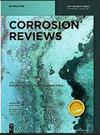金合金Cu5Zn5Al1Sn:半胱氨酸在3.5wt%NaCl溶液中浸泡时间和防腐活性的影响
IF 3.2
4区 材料科学
Q3 ELECTROCHEMISTRY
引用次数: 0
摘要
摘要采用电化学和表面表征技术,研究了半胱氨酸对Cu5Zn5Al1Sn合金在3.5wt%NaCl溶液中不同浸泡时间的腐蚀特性的影响。电化学阻抗谱(EIS)结果表明,Cu5Zn5Al1Sn合金在3.5wt%NaCl中发生降解,并且随着浸泡时间的增加而加剧。根据EIS数据计算的抑制效率结果表明,半胱氨酸可以作为一种有效的防腐物质,扫描电子显微镜(SEM)观察到的合金表面侵蚀较少的形态也证明了这一点。此外,通过拉曼光谱、电子色散光谱(EDS)和X射线光电子能谱(XPS)对合金表面的元素分析进行了研究,证实了S和N物种的存在。根据EIS结果,提出了合适的吸附等温线和抑制机理。本文章由计算机程序翻译,如有差异,请以英文原文为准。
The golden alloy Cu5Zn5Al1Sn: effect of immersion time and anti-corrosion activity of cysteine in 3.5 wt% NaCl solution
Abstract The effect of cysteine on the corrosion characteristics of Cu5Zn5Al1Sn alloy in 3.5 wt% NaCl solution has been studied by electrochemical and surface characterization techniques in various immersion times. The results of electrochemical impedance spectroscopy (EIS) revealed that the degradation of Cu5Zn5Al1Sn alloy occurred in 3.5 wt% NaCl and was aggravated with increasing immersion time. The results of inhibition efficiency calculated from EIS data showed that cysteine can act as an effective anti-corrosion substance, which was also proved by the less eroded morphology of the alloy surface observed on scanning electron microscopy (SEM). Furthermore, the elemental analysis of alloy surfaces was investigated by Raman, electron dispersion spectroscopy (EDS), and X-ray photoelectron spectroscopy (XPS), which confirmed the presence of S and N species. An adequate adsorption isotherm and inhibition mechanism was also suggested based on EIS results.
求助全文
通过发布文献求助,成功后即可免费获取论文全文。
去求助
来源期刊

Corrosion Reviews
工程技术-材料科学:膜
CiteScore
5.20
自引率
3.10%
发文量
44
审稿时长
4.5 months
期刊介绍:
Corrosion Reviews is an international bimonthly journal devoted to critical reviews and, to a lesser extent, outstanding original articles that are key to advancing the understanding and application of corrosion science and engineering in the service of society. Papers may be of a theoretical, experimental or practical nature, provided that they make a significant contribution to knowledge in the field.
 求助内容:
求助内容: 应助结果提醒方式:
应助结果提醒方式:


